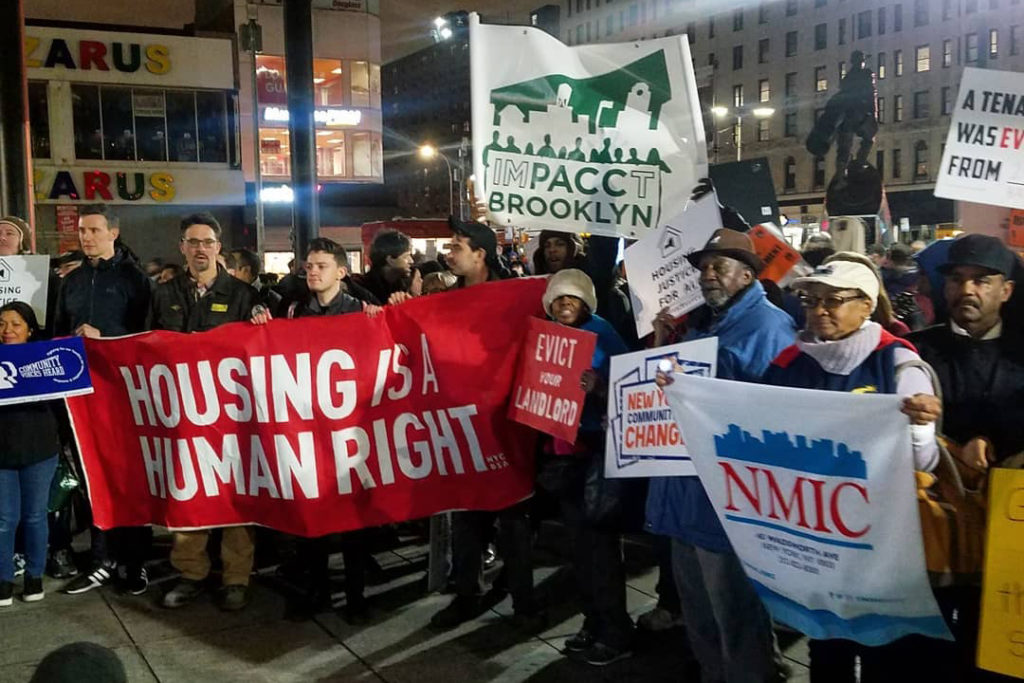We’ve taken a huge step in the fight to reform New York state rent law! Last week, lawmakers finished writing changes to rent laws that will protect the tenants of our state, and Governor Andrew Cuomo signed the bill this week. Unlike past rent reform laws, which could be changed every four years, the new laws passed this week will permanently protect renters and tenants, effective immediately. IMPACCT Brooklyn is an advocate for fair housing and rent reform in New York State, and we’re here to make it easy for you to understand how these new laws will affect renters and tenants.
Keep in mind that some of these rules only apply to tenants in rent-stabilized buildings (which were constructed before 1974 and have more than six units). Learn more here.
You won’t end up on a “tenant blacklist” anymore
The “tenant blacklist” is a list of tenants who are on Housing Court records, often put together by private companies who sell the information to landlords. Ending up on the “tenant blacklist” used to be one of the scariest things that could happen to a tenant, because landlords often use that information to reject low-income clients from renting new apartments, without providing a reason. The new law prevents landlords from rejecting tenants from the “tenant blacklist,” and those who break the law risk prosecution and a $1,000 fine.
No more landlord tricks in rent-stabilized units
In the past, landlords and their family members used an “owner use” trick to take over occupied rent-stabilized units, use them as residences and take them off the market, often as a way to raise rents. Now, landlords are permitted only one “owner use” apartment for their primary residence. The “vacancy bonus,” where landlords hike rents in rent-stabilized apartments as much as 20% after tenants move out, is now illegal as well.
Your rent won’t go sky-high after building improvements
In the past, landlords used renovations to individual apartments or building improvements that “directly or indirectly” benefit tenants in rent-regulated buildings as an excuse to increase rents up to 6%. The new law limits these rent increases to 2%.
You’ll have more time to find an apartment and move out if you’re evicted, and you have more protections against unlawful evictions
The new law gives evicted tenants a full year to remain in their apartment after being evicted, allowing them more time to look for a new residence, and tenants who can pay rent can stay in their apartments (though you’ll still have to pay rent). Seniors and disabled tenants cannot be evicted without good cause, and an unconscionable rent increase is no longer good cause. Additionally, landlords who lock out or forcibly evict tenants will be subject to misdemeanor charges and civil penalties between $1,000 and $10,000 per violation.
You’ll have more notice if your rent increases or if your lease is terminated
According to the new law, landlords who want to end leases or raise rents more than 5% must give 30 days’ notice to tenants who have lived in the building for more than a year, and 60 days’ notice to tenants who have lived in the building for more than two years.
You’ll have protection if you need to break your lease
Under the new law, if you’re a tenant who needs to break your lease for whatever reason, your landlord can’t just sit on your vacant property and expect you to just pay up – they’re now obligated to try and rent it out. However, landlords are still allowed to sue tenants for rent they couldn’t collect during the lease’s terms.
You’ll pay less for security deposits, background checks, credit checks, and late charges
The new law states that market-rate tenants won’t be forced to put down more than a month’s rent for a security deposit. When performing background checks and credit checks, landlords can now only charge for the cost of these checks or $20 each. Finally, your landlord can’t charge you late fees on rent until you’re five full days late paying – and even then, the charges can’t be more than 5% of your rent or $50, whichever is cheaper.
If you or your neighbors are being harassed by your landlord, overcharged for rent, not getting the repairs you need, or facing unlawful eviction, learn your rights and fight back with IMPACCT Brooklyn’s help! Contact our Community Organizing department today for help forming a tenant union, or for one-on-one counseling and free legal assistance!
